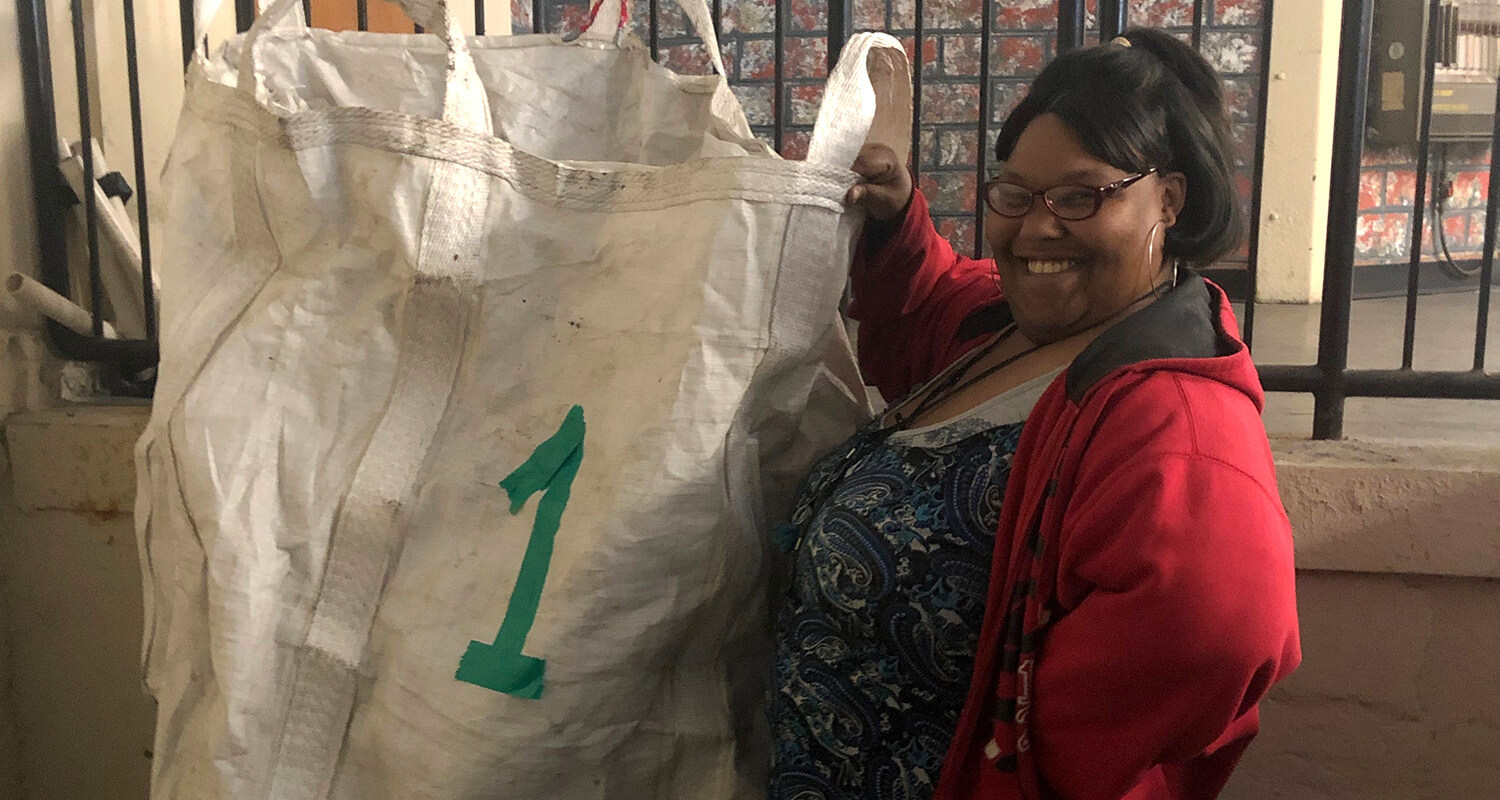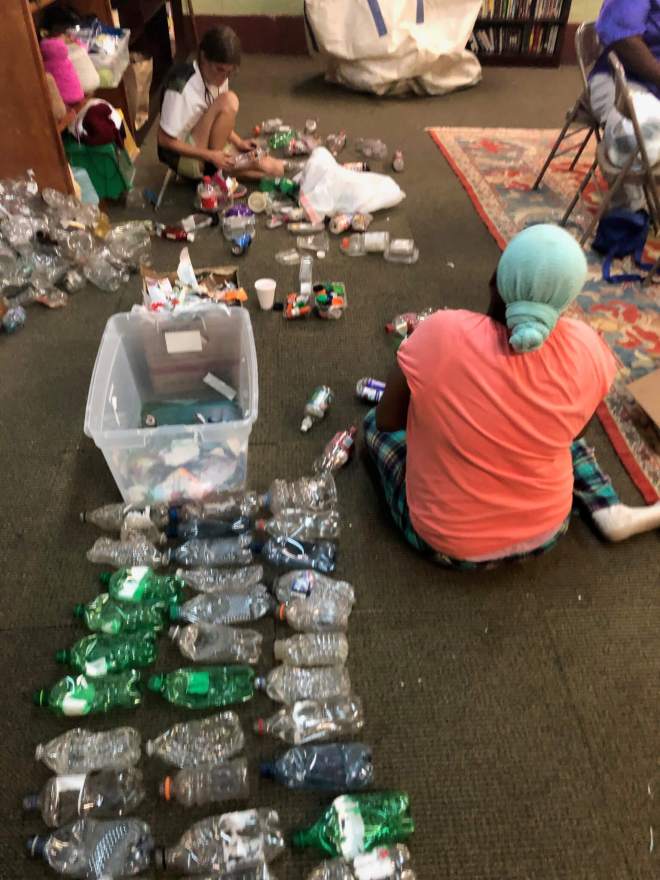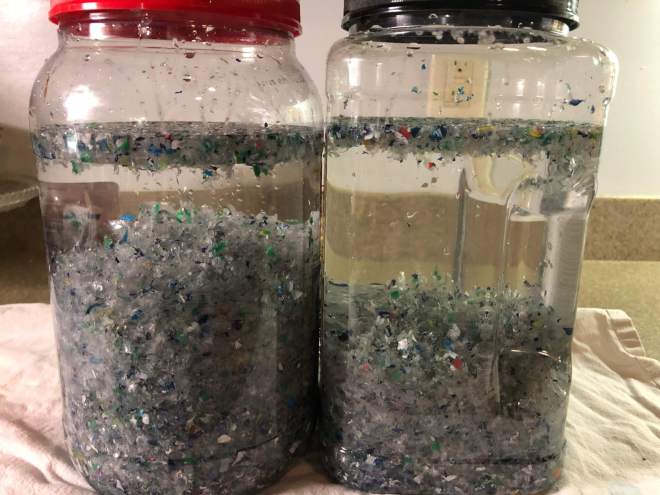EarthKeepers project seeks new life using discarded plastics in downtown Birmingham

By Christie R. House
February 2020 | ATLANTA
The Rev. Adam Burns, an ordained deacon in full connection with the North Alabama Conference, encounters many challenges as pastor of the Church of the Reconciler, a United Methodist mission church in downtown Birmingham. Members of his congregation often struggle to find permanent housing and jobs, and they work hard to stay clean and sober despite their circumstances.
Burns has worked for eight years with this congregation that seeks to reimagine ministry with low-income men and women, some of whom live on the streets. “We hope to create a path toward employment and an abundant life so that it is easier to make positive, life-giving choices than to submit to a drug of choice. We hope to transition the community away from hopelessness toward embracing an ethic of support, positivity and encouragement,” Burns said in an interview.
The downtown community is also challenged to find a place to recycle plastics, even for those who are motivated to do so. While this may seem less immediate than the struggle to meet basic needs, Church of the Reconciler hopes to turn this challenge into a benefit for the church and community.

PHOTO: MOLLIE ERICKSON
The business of recycling in a community that doesn’t
Burns describes his interest in EarthKeepers as taking place in stages. “I have always been interested in stewardship of the earth and climate justice,” he noted, “but felt overwhelmed by the information about what is happening and the apathy that seems to exist on several levels of our society.” He noted that becoming a father was what propelled him to get personally involved. “When my kids get older and ask me why we left them a planet in such a mess, I can at least tell them what we tried to do.”
“I am usually a glass half-empty sort of person,” Burns admitted, “but I was inspired.” He Googled “climate change and The United Methodist Church” and found the Climate Summit that took place in Nashville, Tennessee, last year. At the summit, he learned about Global Ministries’ EarthKeepers network of United Methodists concerned about care for the earth and the environment and experienced a “lightbulb moment.” Why not unite EarthKeeping and climate justice with the marginalized community he serves?
Most well-meaning people and church programs start ministry with the poor by treating marginalized populations as if they are unable to do anything for themselves. “But a marginalized community is an untapped resource,” Burns explained, “with creativity and skills. There is no reason this community could not help Birmingham and contribute to its well-being.”
The men and women he encounters in the community are already creative and hardworking, he says. About 80 percent of his congregation live on the streets around the church. They have come for referrals or services, looking for shelter or access to health care. They return for worship on Sunday and Bible study or other small-group meetings during the week.
The congregation and some volunteers and partners identified waste management as a problem in the city. In fact, according to Dennis Pillion of AL.com, Alabama has one of the largest recycling plants in the world, KW Plastics in Troy, but it doesn’t recycle enough plastic within the state to supply its manufacturing needs. In fact, Alabama still buries much of its discarded plastic. This means KW ships recycled plastic from California, New England, as far away as Europe, to get the volume of plastics it needs to produce the pellets manufacturers use to make bottles and other containers.
While affluent communities enjoy curbside pick-up for recycle, lower-income areas, like those in downtown Birmingham, have no such service. Step-by-step, Church of the Reconciler has started planning its new venture.
Partnering and sharing resources
After receiving further training and joining EarthKeepers last year, Burns was approved for a modest Global Ministries’ EarthKeepers grant to get the recycling project up and running. In addition to his M.Div., from Iliff School of Theology in Denver, Burns also earned bachelor and master degrees in economics from the University of Alabama.
The Rev. Jenny Phillips, Global Ministries’ senior technical advisor for Environmental Sustainability and director of the EarthKeepers program, said that plastic waste is a global problem that impacts United Methodists around the world. “Church of the Reconciler is creating a path for churches to address the waste and serve vulnerable populations at the same time. The recycling project is a terrific example of how integrating creation care into mission and ministry strengthens communities,” she commented.

PHOTO: MOLLIE ERICKSON
A consistent volunteer from another UMC, Mollie Erickson, researched methods for processing recycled material and found Precious Plastics. Its open source plans allow anyone to design recycling equipment, such as the shredder the church is now using and an extruder that reforms the plastic.
Currently, Church of the Reconciler has established a collection station behind the church. Some members collect plastics, and they’ve also asked housing projects and other churches for help. They recycle #1 and #2 plastics, which they hope to shred, melt and reform to create new products.
Few places will take #5 plastic, but KW Plastics uses #5 to make paint buckets. If the church can establish infrastructure to collect, store and bind 40,000 lbs. of #5, KW Plastics will come and get it – and pay for it.
“We believe that God believes you should have an abundant life,” Burns explained. “If you are here all day wasting your life drinking and doing drugs – you’re missing the opportunity to experience a much fuller existence. We encourage people to come in and help us or talk about why they are not working, so we can direct them to resources.” At this stage, only a few positions are available for sorting and shredding, but eventually, once they get a return on their collections, opportunities will expand.
Though he says that much of the project is still in the idea stage, the church is making progress. It’s a big change for this mission church, supported by the conference and partner churches, in how it sees itself and its ministry. Church of the Reconciler was a new church start 25 years ago. A lot of “stuff” has been given away to community members over those years, but that model of ministry didn’t transform the church or the community.
Burns concluded: “When people need a real job, we hope to be an incubator of job skills and employment opportunities. We will also need to rehabilitate the work ethic in this community – to build up members’ abilities to hold jobs, meet deadlines, follow-through with tasks. We plan to put that process in the church and come up with something beautiful.”
Christie R. House is a consultant writer and editor with Global Ministries.

